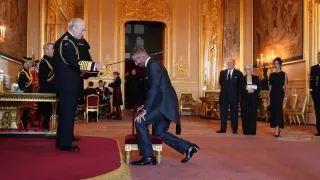
4 hours ago
Love, Borders, and Gut-Punches: ‘America’ Redraws Queer Romance in the Age of ICE Raids
READ TIME: 3 MIN.
There’s a particular kind of magic to the queer meet-cute: the flutter of possibility, the first shared joke over sticky tables, the rush of new connection. But in Aly Muritiba’s "America", that magic collides headfirst with the hard reality of U.S. Immigration and Customs Enforcement (ICE) raids—a collision that feels all too familiar for many in our community living under the shadow of systemic precarity and xenophobia. Cheyenne Jackson (a favorite in LGBTQ+ circles for his Broadway and TV turns) and Luca Castellani (the model-turned-actor whose own immigrant experience inspired the story) star as lovers whose romance is threatened not by personal drama, but by the machinery of the state.
Set in a Los Angeles where hope and fear live side by side, "America" isn’t just a short film—it’s a 22-minute gut punch that refuses to let you look away. The story follows Tom (Castellani), a Brazilian immigrant hustling for the American dream as a waiter, and Josh (Jackson), a journalist chasing stories and connection. Their budding relationship is intimate, playful, and refreshingly ordinary, until the ordinary is shattered in an instant by an ICE officer’s arrival. Suddenly, every moment of joy is tinged with the threat of loss—a reality that resonates far beyond the screen.
What makes "America" more than a political drama is its insistence on emotional truth. Under Muritiba’s direction (the Brazilian filmmaker behind the acclaimed queer feature "Private Desert"), the film becomes a meditation on belonging, love, and the cost of survival. Muritiba wanted “to create a story about tolerance, about love, and how important it is to look at each other,” as he told The Hollywood Reporter. “I wrote scenes that would show the audience, this guy is just like you, he has fears and dreams and feelings”.
Castellani’s performance is the anchor—equal parts vulnerability and resilience. One scene near the end, where Tom drives through the night with a dying partner and sings their song, has been described as “eternal”—the emotional resonance stretching far beyond the film’s running time. It’s the kind of moment that forces you to confront not just the heartbreak of the characters, but the heartbreak of a world that treats love as a privilege rather than a right.
For queer audiences, especially immigrants and those living at the intersection of multiple marginalized identities, this story isn’t just art—it’s testimony. Castellani’s real-life journey, saving up since he was 17 to become an actor and finally earning American citizenship in June, underscores the film’s message. He posted on Instagram after gaining citizenship: “I will vote. I will speak up. And I will fight for the rights of immigrants, because our voices and our stories matter”.
The technical artistry behind "America" is as quietly radical as its storytelling. Andressa Cordeiro’s cinematography bathes the film in twilight hues, turning bathrooms and car interiors into canvases for longing. Karen Akerman’s editing pulses with the rhythm of a heartbeat, while Pavel Iaroshenko’s sound design uses silence as a weapon—the kind that makes you lean forward, not back.
It’s a film that doesn’t compete with its own message; every technical choice is in service of compassion. Muritiba’s knack for discovering new talent is on full display with Castellani, whose screen presence recalls the vulnerable intensity of Gael García Bernal or Timothée Chalamet in their breakout queer roles. The result is a story that feels painfully, beautifully real—a rarity in an awards season often crowded with high-concept shorts.
"America" premiered at the Nuart Theatre in Los Angeles, drawing packed houses and post-screening silences—the kind that signal genuine impact, not just fleeting buzz. With Oscar eligibility in the Best Short Film (Live Action) category, and the Academy making it easier for members to opt into voting for shorts, there’s early chatter that this could be the dark horse to watch.
For LGBTQ+ audiences, especially those whose lives have been shaped by migration, bureaucracy, or the threat of violence, "America" is more than timely—it’s necessary. The film asks, “What does it mean to belong, if love itself makes you a stranger?” In a world where borders are often drawn to exclude, Muritiba’s film redraws them with empathy and artistry.
It’s the type of story that lingers. At post-screening conversations in LA and London, one phrase keeps surfacing: “It’s the one that stays with you”.
"America" reminds us that queer cinema doesn’t just chronicle love; it interrogates the conditions under which love can survive. It’s a film for anyone who’s ever had to fight for the right to exist, to love, and to dream—no matter which side of the border they’re on.






